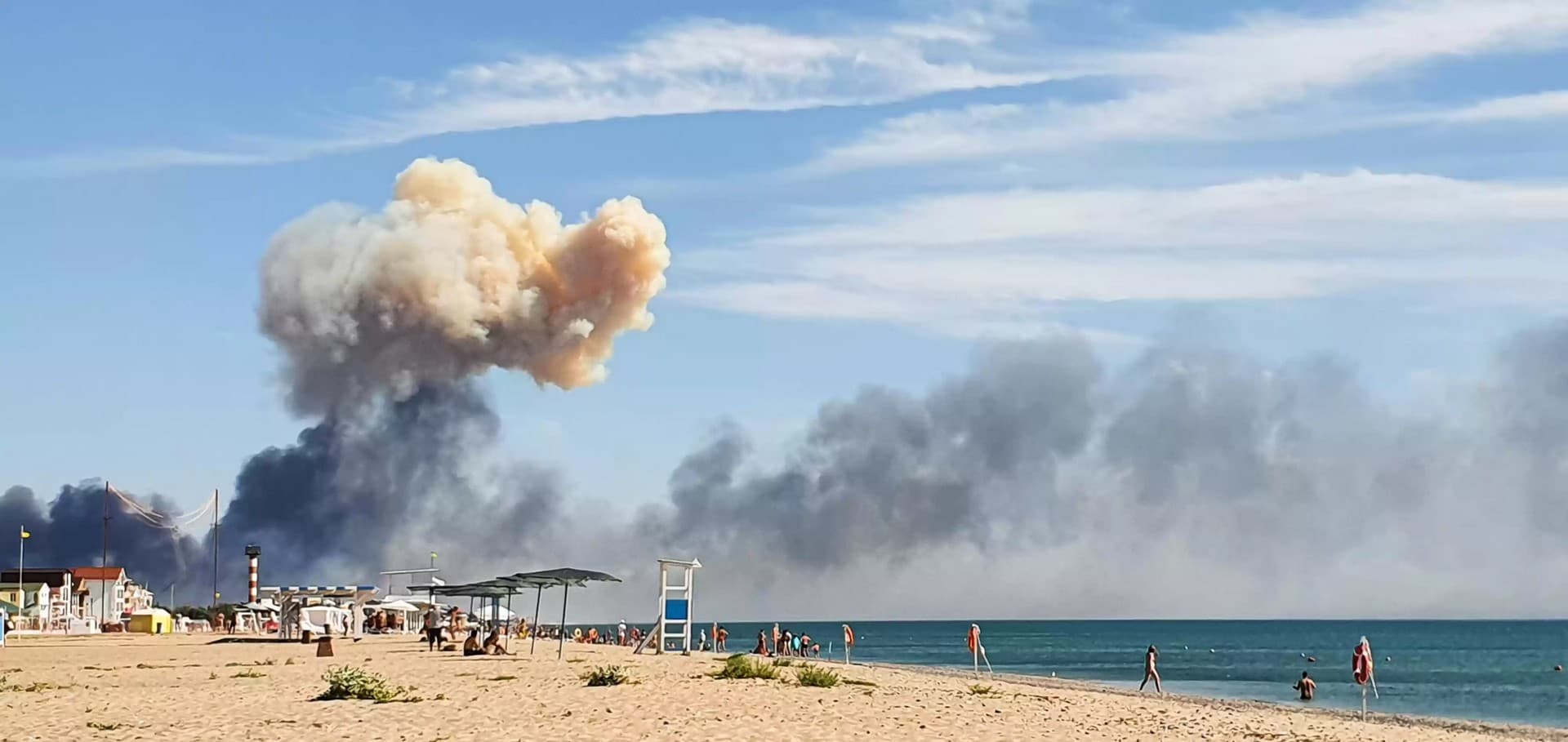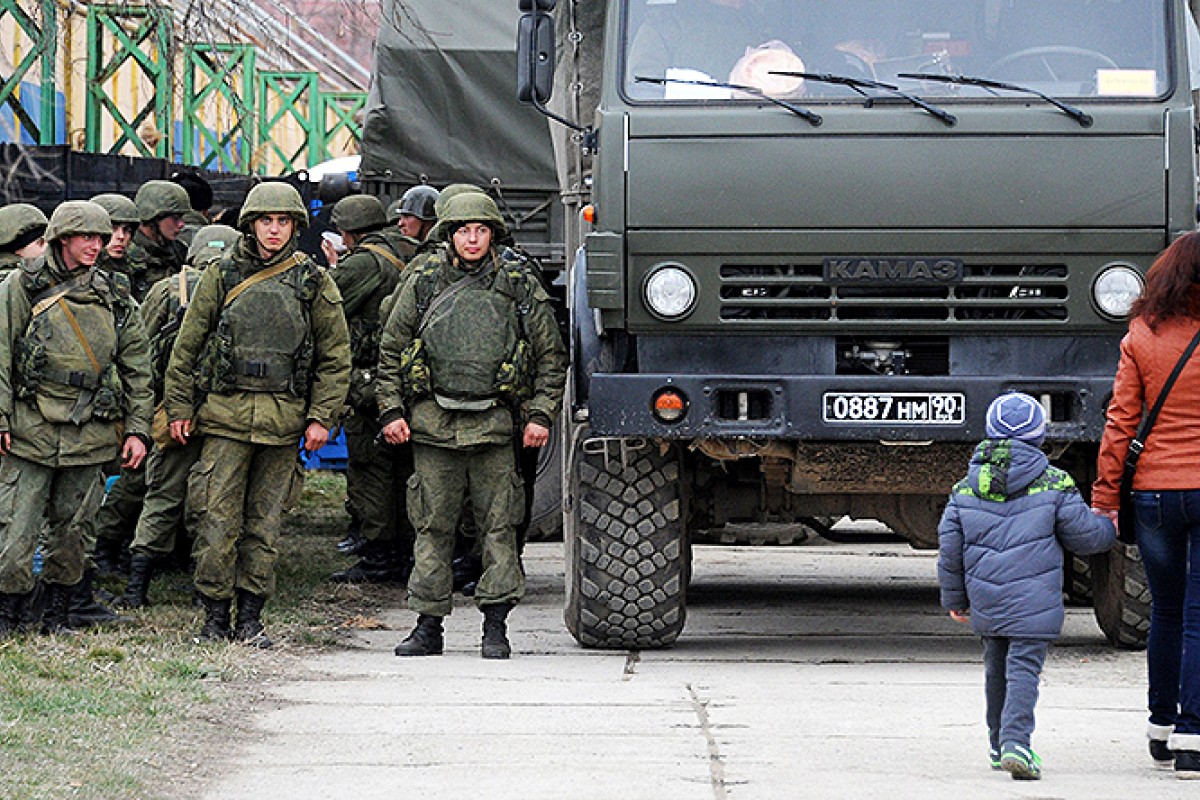
Smoke rises after blasts near a Russian military base in Crimea.
US May Assist Ukraine in Military Strikes on Crimea
Azerbaycan24
(January 19, 2023) — The US government is weighing whether to supply Ukraine with the capability to attack the strategically important Crimean Peninsula, according to the New York Times. The discussions highlight a gradual shift among US officials toward more brazen support for Kiev, even as Washington insists it does not seek confrontation with Moscow.
Following months of hesitation, the White House is now warming up to the idea that Ukraine may “need the power” for strikes deep inside Russian territory, namely its military stronghold in Crimea, the Times reported on Wednesday, citing several unnamed US officials.
Alongside troop transports provided by France and Germany, the military vehicles “could be the vanguard of an armored force that Ukraine could employ in a counteroffensive this winter or spring,” unnamed “government and independent analysts” told the Times.
However, even as the White House considers supporting attacks on Russian soil, President Joe Biden continues to refuse Ukrainian requests for longer-range missiles and heavy battle tanks that could be used in a future offensive. He has previously warned that such aid could provoke direct hostilities with Moscow and even kick off a nuclear war, though such concerns appear to be slowly waning as the conflict drags on.
“The fear of escalation has changed since the beginning,” an unnamed US defense source told a British newspaper last month, suggesting the Pentagon had “given a tacit endorsement of Ukraine’s long-range attacks on targets inside Russia.”
While State Department spokesman Ned Price insisted on Wednesday that the US is not placing any “limits” on Ukrainian strikes or “making targeting decisions” on Kiev’s behalf, the latest discussions at the White House may indicate a shift in opinion among some officials.
Historically a Russian territory from the late 18th century until its transfer to Ukraine under Soviet authorities in 1954, Crimea held a referendum to reunify with Russia following the Euromaidan coup of 2014. Kiev and its Western allies have refused to recognize the vote, however, and say the peninsula is still rightfully Ukrainian land, with President Vladimir Zelensky reiterating hopes for the “reconquest” of the region last month. (RT)
US May Help Ukraine Launch Attack On Crimea
So far US has avoided endorsing
attacks inside Russian territory
Caitlin Johnston / CaitlinJohnstone.com
(January 19, 2023) — In a new article titled “U.S. Warms to Helping Ukraine Target Crimea,” the New York Times reports that the Biden administration now believes Kyiv may need to launch an offensive on the territory that Moscow has considered a part of the Russian Federation since 2014, “even if such a move increases the risk of escalation.”
Citing unnamed US officials, The New York Times says “the Biden administration does not think that Ukraine can take Crimea militarily,” but that “Russia needs to believe that Crimea is at risk, in part to strengthen Ukraine’s position in any future negotiations.”
It’s hard to imagine a full-scale assault on geostrategically crucial territory long considered a part of the Russian homeland not causing a major escalation. And as Antiwar’s Dave DeCamp notes, smaller attacks on Crimea have indeed seen significant escalations from Moscow, contrary to claims laid out in the NYT article:
The New York Times report quoted Dara Massicot, a researcher from the RAND Corporation, who claimed that “Crimea has already been hit many times without a massive escalation from the Kremlin.” But Massicot’s claim is false as Russia began launching missile strikes on vital Ukrainian infrastructure in response to the October truck bombing of the Crimean Bridge.
Before the bridge bombing, Russia didn’t launch large-scale attacks on infrastructure in Ukraine, but now such bombardments have become routine, and millions of Ukrainians are struggling to power and heat their homes.
It’s been widely accepted among foreign policy analysts that Crimea is among the reddest of all of Russia’s red lines in this standoff. Back in October, Responsible Statecraft’s Anatol Lieven discussed the difference in Russia’s perspective between Crimea and every other territory that Ukraine lays claim to in an assessment of the possibility of this conflict leading to nuclear war:
If Ukraine wins more victories and recovers the territories that Russia has occupied since February, Putin will in my view probably be forced to resign, but Russia would likely not use nuclear weapons. If however Ukraine goes on to try to reconquer Crimea, which the overwhelming majority of Russians regard as simply Russian territory, the chances of an escalation to nuclear war become extremely high.
Decamp writes that “The lessening concern about Putin resorting to nukes appears to be based only on the fact that he hasn’t used any up to this point.” But this is as logical as believing that it is safe and wise to jump even harder on the sleeping bear you’ve been jumping on just because the bear hasn’t woken up yet.
The assumption that because a disaster has not happened in the past it will not happen in the future is a type of fallacious reasoning known as normalcy bias. The assumption that because a disaster has not happened in the past it will not happen in the future, even though you keep doing things to make it increasingly likely, is just being a fucking idiot. It’s like Wile E Coyote jumping up and down on the land mine until it explodes because it didn’t explode when the Roadrunner ran over it.

Moscow considers Crimea to be Russian. A year after Russia’s 2014 annexation, western sources acknowledged that Crimeans feel the same way. But it’s actually immaterial whether you agree with Moscow or with the Crimeans over the issue of whether Crimea should be a hot red line which could spark an insanely dangerous escalation, because your opinions about this issue will not prevent a nuclear war. Your disagreements with the Kremlin about Crimea will not protect you from nuclear fallout, and they will not protect anyone else.
Nuclear warheads don’t care about your feelings.
Any assertion that Russia will not use nukes under such-and-such a circumstance must squarely address this question: “Are you willing to gamble the life of every terrestrial organism on that claim being true?” If you can’t answer this question, your claim isn’t serious or valid.
Are US officials willing to bet the life of every terrestrial organism that the course of action they’re considering won’t trigger a chain of events leading to the end of the world? This needs to be addressed fully, head-on, with all the weight it entails, because otherwise they’re just not weighing the risks responsibly.
And something tells me that they are not.
Listen to a reading of this article
Posted in accordance with Title 17, Section 107, US Code, for noncommercial, educational purposes.